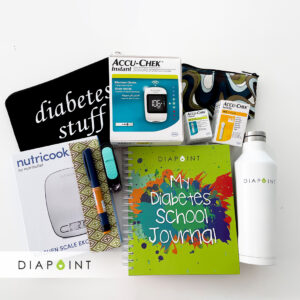Coping with Diabetes: The Importance of Healthy Diet and Hydration


- If you have Type 1 or Type 2 Diabetes, controlling your diet and hydration is a key part of your ongoing care and treatment.
- Nabta Health is pleased to be partnering with Diapoint ME to provide care and support to women with diabetes.
- The following nutrition and hydration guide is provided by Pam Durant from Diapoint ME and is useful for anyone, not just diabetics.
When coping with diabetes, eating a healthy and balanced diet and maintaining hydration is important to achieve good health, a healthy body weight and to help you feel your best. A healthy and balanced diet is about eating a wide variety of foods from all the food groups and in the right proportions. Try to choose a variety of different foods from the five main food groups to get a wide range of nutrients:
- Fruit and Vegetables
- Carbohydrates like potatoes, bread, rice, pasta and other starchy carbohydrates.
- Beans, pulses, fish, eggs, meat and other proteins.
- Dairy (milk, yogurt, cheese) & Alternatives
- Fats & Oils (e.g. spreads and olive oil)
What is a portion size?
- 80g of preferably fresh, or canned or frozen fruit and vegetables
- 30g of dried fruit – which should be kept to mealtimes
- 150ml glass of a low sugar smoothie
- 1 piece of fruit such as a small apple, banana, pear or similar-sized fruit
- A slice of pineapple or melon is also one portion
- Three heaped tablespoons of vegetables is also one portion.
A useful way to improve your portion control is to start using a digital food scale when planning your meals.
Diabetes nutrition and hydration: fruits & vegetables
Aim to include five portions of fresh fruits and vegetables a day. They are the best source of vitamins and minerals and fibre, and should make up over a third of the food you eat each day.
How much starchy foods and carbohydrates for a diabetic?
Starchy foods should make up just over a third of everything you eat. Make sure to go for wholegrain or wholemeal varieties of starchy foods, such as brown rice, wholewheat pasta, and brown, whole meal or higher fibre bread. You can learn more about rice and carbohydrates in this article here.
Protein
Many people often think that meat is the primary source of protein to stay healthy. We are happy to say that protein can be found in a variety of foods – not just meat.
Beans, pulses, fish, eggs, meat and other sources of protein are essential for the body to grow and repair itself. These foods are also good sources of a range of vitamins and minerals.
While meat is a good source of protein, vitamins and minerals, including iron, zinc and B vitamins, we prefer to be as plant based as possible. Try to eat as little red and processed meats as possible. If you do eat meat, choose lean cuts of meat and skinless poultry whenever possible.
Eggs and fish are also great sources of protein, and contain many vitamins and minerals. Oily fish is particularly rich in omega-3 fatty acids. Aim to eat at least two portions of fish a week, including one portion of oily fish to get all those wholesome omegas.
Pulses, including beans, peas and lentils, are naturally very low in fat and high in fibre, protein, vitamins and minerals.
Nuts are high in fibre, and unsalted nuts make a good snack. But they do still contain high levels of fat, so eat them in moderation.
Which milk, dairy and alternatives for a diabetic?
Milk and dairy foods, such as cheese and yoghurt, are good sources of protein. They contain calcium, which helps keep your bones healthy. Go for lower fat and lower sugar products whenever possible. There are many vegan alternatives now for dairy products. Read the labels to avoid substitutes that are over processed or have too much added sugars.
How much fats and oils?
Some fat in the diet is essential, but try to avoid eating too much saturated fat and remember to avoid trans fats completely. Trans fats are made through a chemical process of the hydrogenation of oils. They are most commonly found in things like vegetable shortening, some margarines, crackers, cookies, and snack foods. It is so important to eat fats that are healthy. Yes, there are healthy fats like the monounsaturated fats found in olives, peanuts, sesames, avocados and olives.
If you have a new diabetes diagnosis and you are unsure of how to manage this change in your life, a Nutrition for Diabetes Management Health Coaching Session can help. We will guide you to manage your nutrition and understand the fundamental principles of managing diabetes nutrition.
Diabetes and Hydration
Getting enough water everyday is important for your overall health
Water Helps Your Body
- Regulate it’s temperature
- Prevent constipation
- Improve digestion
- Lubricate joints and prevent pains
- Maintain spinal cord health
- Get rid of wastes and toxins
- It even helps maintain blood sugars
According to the CDC, drinking enough water daily can improve skin complexion and blood pressure. Sufficient hydration can also support weight loss goals.
These are just a few of the reasons you need to make a habit of proper daily hydration!
Tips To Drink More Water
If you are often on the road, you should always take a water bottle with you.
Invest in a large metal water bottle and fill that before you leave for work in the morning. If you get the right brand, the water will stay cool all day.
Avoid plastic bottles (even reusable ones) because not only are they bad for the environment, they are bad for us too. As plastic heats up, it releases harmful particles into your water that you will end up drinking. Also, during work hours, you should always keep a water bottle near you that you can easily access and drink from regularly. If that is not an option, you must remember to drink lots of water during breaks. Keep a personal water bottle and make a habit of keeping it near you even when relaxing in front of the TV at home.
Ensure you maintain your hydration include making a habit of drinking water first thing in the morning because our bodies lose hydration in our sleep. Also, remember to drink some water before and during meals.
Some beverages like herbal tea can also help maintain hydration, but just water is always the best way.
Aim to drink two liters of water daily.
Written by Pam Durant, Diapoint Me
___
Nabta is reshaping women’s healthcare. We support women with their personal health journeys, from everyday wellbeing to the uniquely female experiences of fertility, pregnancy, and menopause. You can track your menstrual cycle and get personalised support by using the Nabta app.
Get in touch if you have any questions about this article or any aspect of women’s health. We’re here for you.












































